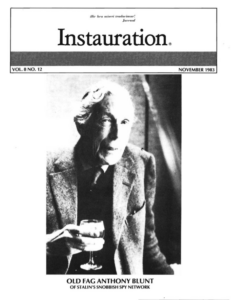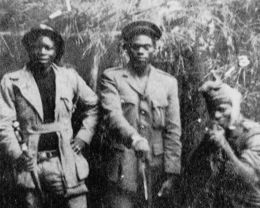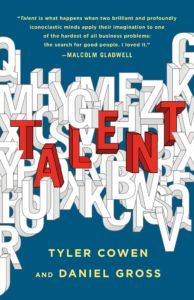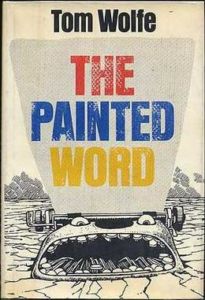In the early 1980s I was involved with the startup of a “humor magazine” that never went anywhere after its colorful-but-vague pilot issue. Apart from a couple of National Lampoon veterans, we were mostly post-collegiate types, full of quirky, off-the-wall ideas from our own days at colorful-but-vague college humor mags. It was around this time that one of my colleagues mentioned, as a bit of curious arcana, that he had heard that somewhere out there was a racist humor magazine. (more…)
Tag: Tom Wolfe
-
3,129 words
Introduction
It can be instructive to look at the racial politics of 50 or 60 years ago, so here are three illustrative episodes. The first section below paraphrases six pages of Tom Wolfe’s essay “Mau-Mauing the Flak Catchers” (1970). The second summarizes Wikipedia’s article about the Black Power movement (1965-c. 1985). The third gives an account of Afrocentrism (1970 to date). Each shows us a precursor of Black Lives Matter. (more…)
-
2,620 words
The Secret History, originally published in 1992, was Donna Tartt’s first novel, and I admit I approached it backwards, reading her novels The Little Friend and The Goldfinch before tackling this one, which will complete my reviews of her works on this site. It is a compelling and masterfully written tale. Tartt’s style is dense and beautifully descriptive, with passages such as:
My path took me beneath a row of apple trees, full-blown and luminous, shivering in the twilight like an avenue of pale umbrellas. The big white flakes drifted through them, dreamy and soft. (more…)
-
Tyler Cowen & Daniel Gross
Talent: How to Identify Energizers, Creatives, and Winners Around the World
New York: St. Martin’s Press, 2022The identification and proper allocation of talent is essential to the success of any organization. Hiring the wrong people is costly, especially for groups with limited capital. It would thus behoove White Nationalists to become amateur talent-spotters and students of human behavior. The book in question is a solid starting point. (more…)
-
Finally getting to Kerry Bolton’s Artist of the Right was an honest realization of how little I knew of the history of dissident, Right-wing art and literature. One of the artists I was most intrigued by was Wyndham Lewis, and particularly his first novel, Tarr. Though it was originally published in 1918 and later revised in 1928, what makes this piece of literature as timeless and as relevant as ever is its inclusion of not only a place – Paris –, but an entire ideology and way of life as a main character in the story. (more…)
-
Visiting an art gallery in Washington, DC long ago, I gazed at amorphous shapes for a good while. Some abstract art is good, speaking directly to the subconscious mind, but this stuff just wasn’t doing it for me. The only message I got out of it was a mild scolding from my superego about wasting a few bucks. However, one exhibit in the entire exhibit actually looked like something. That’s probably the reason why it’s the only item I remember. In fact, it was obvious that some effort went into making it, setting it apart from much of the other Entartete Kunst. (more…)
-
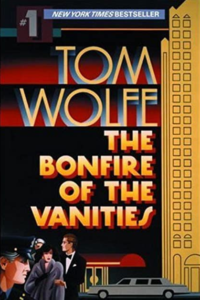 2,418 words
2,418 words 2,418 words
2,418 wordsTom Wolfe
The Bonfire of the Vanities
New York: Bantam, 1987When the Left finally gets around to banning (or burning) classic novels, Tom Wolfe’s Bonfire of the Vanities will likely be on the top of the list. Unlike Mark Twain’s Adventures of Huckleberry Finn, Bonfire’s great sin is not merely being linguistically taboo but substantively taboo as well. (more…)
-
2,943 words
So long, Frank Lloyd Wright
I can’t believe your song is gone so soon.
I barely learned the tune
So soon, So soon.
Architects may come and
Architects may go and
Never change your point of view.
When I run dry
I stop awhile and think of you.— Simon and Garfunkel, 1969 (more…)
-
“Keep it up, and even if you do get my job you’ll never run this place. You’ll die in that corner office, a midlevel executive with a little bit of hair who women go home with out of pity. Want to know why? Because no one will like you.”[1]
The poohbahs of the manosphere often put me in mind of the Stalinist shop steward played by Peter Sellers in I’m All Right, Jack — (more…)
-
2,690 words
Lars Holger Holm
Hiding in Broad Daylight: An Analysis of the Political Radicalisation and Commercialisation of Artistic Modernism
London: Arktos, 2015“Charles,” said Cordelia, “Modern Art is all bosh, isn’t it?”
“Great bosh.”
—Brideshead Revisited (1945) (more…)
-
Tom Wolfe
Back to Blood: A Novel
New York: Little, Brown and Company, 2012Tom Wolfe’s Back to Blood is a quick read despite its 700-page length, and absorbing. Of his four novels, The Bonfire of the Vanities (1987) about race tensions in New York City is the most famous, but his second, A Man in Full (1998), is better. (more…)
-
I stopped reading contemporary literature—works by living novelists and short story writers—when I was in my late teens or early twenties. I found it aesthetically and intellectually unrewarding. The sole exception was the work of journalist-turned-novelist Tom Wolfe, the Virginia-born, New York City-based founder and exponent of New Journalism, a type of feature reporting employing literary techniques. (more…)
